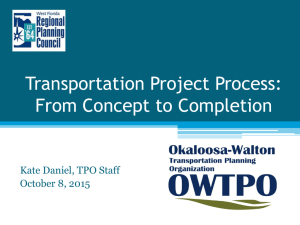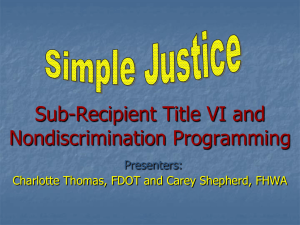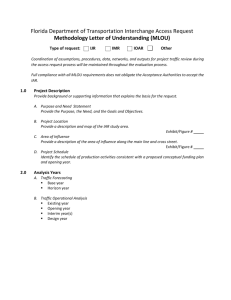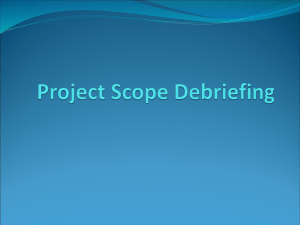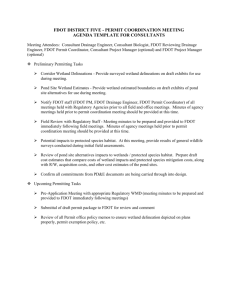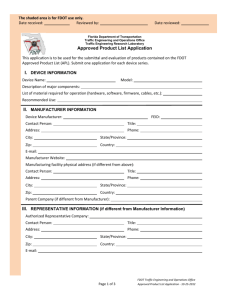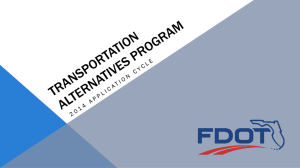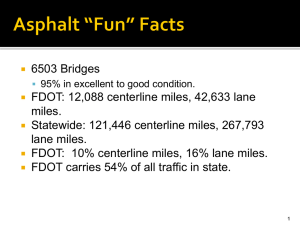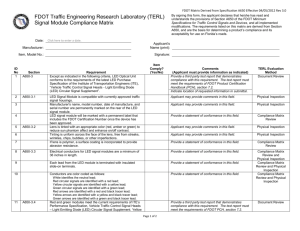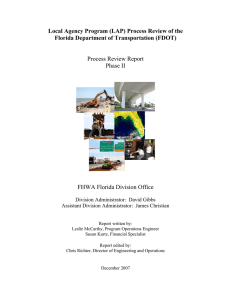SCAT
advertisement
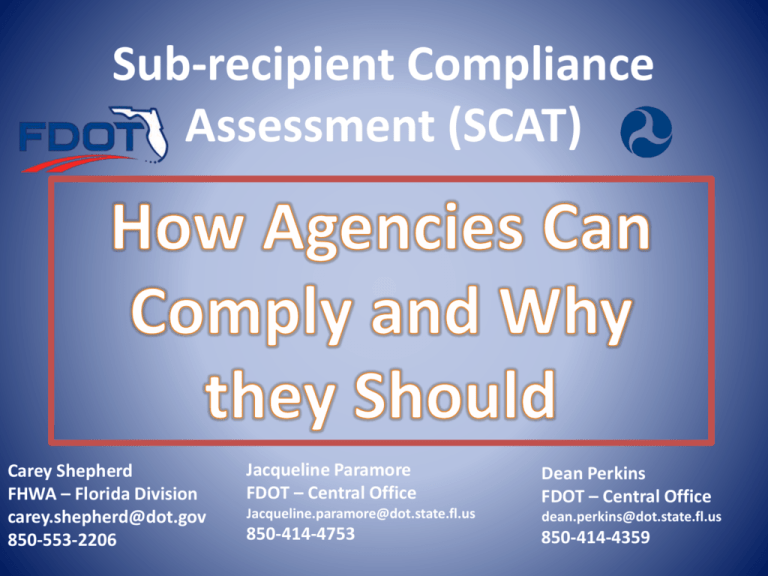
Sub-recipient Compliance Assessment (SCAT) Carey Shepherd FHWA – Florida Division carey.shepherd@dot.gov 850-553-2206 Jacqueline Paramore FDOT – Central Office Jacqueline.paramore@dot.state.fl.us 850-414-4753 Dean Perkins FDOT – Central Office dean.perkins@dot.state.fl.us 850-414-4359 What’s the Solution? Partnership Trust Verification Data Implementing the Solution When is SCAT Required? Complete the SCAT whenever: –your agency certifies or recertifies –It is requested by a funding or oversight authority (FDOT, FHWA, FTA, etc.) –there is change in the executive leadership of your agency –you need practice or want to train staff Who Completes the SCAT? Generally the person selected as the Nondiscrimination Coordinator collects and submits the SCAT. However, this could vary agency to agency – it’s up to you. It isn’t necessary that the Coordinator know the answers. Rather, they should be able to reach various agency departments or officials to gather responsive information. Getting Started Visit the FDOT LAP website at: www.dot.state.fl.us/specificationsoffice/LAP/For ms/LapForms.shtm Click on SCAT . . . It looks like this Next . . . Enter the name of your agency and determine if your agency has 49 or fewer employees or 50+. These are full or part time employees, in all departments. The First 3 Questions: • Need immediate attention • Are deal breakers – FDOT cannot do business with agencies lacking these items • Are the only questions reviewed by the District LAP Administrators Question 1 Question 2 Does your agency have a written nondiscrimination policy along with procedures for filing and resolving a complaint about race, color, national origin, sex, age and disability? . Question 3 Is your agency constructing or improving curb raps in connection with resurfacing projects? Hint: The answer should not be ‘no’. Recent direction by US DOT and US DOJ require curb ramp installation or improvement as part of resurfacing at a minimum. Note: ADA is not tied to funding! See the Guidance at: https://www.fhwa.dot.gov/civilrights/program s/doj_fhwa_ta.cfm The other questions aren’t important? BUT: • They are easier to implement, or; • Many agencies already have some or most of them, or; • It is questionable to what extent we (FHWA and FDOT) have enforcement jurisdiction. Let’s go through them one by one Question 4 Who is/are your Nondiscrimination Coordinators? • Regulations require ‘easy access’ • Highway regs require coordinators be identified by name, not just title • Again, the Coordinator need not be an expert, just a responsible person who can tap various programs for information Question 5 Using the check boxes, indicate how your agency advises the public of nondiscrimination policies/procedures? In short, we are looking for at least two methods – preferably one electronic, one traditional, though there is no specific requirement or method. Question 6 Limited English Proficiency (LEP) requires a written plan of reasonable steps to provide meaningful access to those who do not speak English. • Does not cover all documents • Requires a four factor analysis • May result in your agency not having to provide LEP services Notice that we don’t ask to see your LEP Plan? Unless your agency is selected for a program area review, this is a matter of trust. You may consider developing a list of employees who speak another language to help customers Question 7 As with LEP, the SCAT includes a question on Environmental Justice. Does your agency take steps to avoid, minimize or mitigate disproportionately high or adverse impacts to minority and/or low income communities? Question 8 Similar to Question 7 – a major tenet of Environmental Justice is access to and collection of information from low income and minority communities. The SCAT includes a drop down of the most common ways you use to involve the public. However, you may do others Question 9 Similar to Questions 7 and 8, this goes to EJ compliance, but also to Title VI. 23 CFR 200.9(b)(4) requires recipients to collect and review demographic data on those impacted by its decisions. Almost all agencies use census data, but there are others as well – the most common are listed. In other words, how do you know your community’s characteristics? Question 10 Including the Clauses of Appendix A from the Nondiscrimination Agreement/Policy Statement in LAP contracts and subcontracts, construction or professional services is required by FDOT. Question 11 Inclusion of FHWA 1273: • Physically incorporated in construction contracts • Regardless of Tier • May not be altered • May not be incorporated by reference Question 12 Include DBE Assurance language from 49 CFR 26.13(b) in professional services and contracts, regardless of tier. • The May 2012 version of 1273 included the assurance language for construction. • However, professional services agreements still need it! www.gpo.gov/fdsys/pkg/CFR-2011-title49vol1/pdf/CFR-2011-title49-vol1-sec26-13.pdf A note on the DBE Program for LAP • FHWA does not approve sub-recipient DBE goals or plans • Generally speaking, FHWA only has one Recipient – FDOT. To the extent FDOT has a LAP program, its DBE program governs • This is politically unpopular with many local agencies but FDOT and your Division do not have the authority to grant exceptions Question 13 We need to ascertain that your design standards are consistent with or beyond those approved by DOJ Use the drop down menu Question 14 Does your agency install truncated dome detectable warnings on curb ramps? Question 15 Does your organization use the FDOT design exception process for determining ADA technical infeasibility? If you have never had an issue of technical infeasibility or if you use the FDOT process – that’s fine. However, if you have your own exception or variance process for ADA infeasibility, provide a copy or the link. Question 16 This question was modified based on concerns that FHWA and FDOT lacked the authority to approve these plans. However, for most local agencies, they are required by 28 CFR 35.150(d), along with an underlying self evaluation (28 CFR 35.105) What about ? If public transportation is provided in your jurisdiction, are bus stops accessible to all riders, including those using wheelchairs or other mobility aids? – Approach to stop – Access at stop – Boarding & alighting area (5’x8’ pad) – Benches – Shelters Question 17 • Employment is covered by Title VII and other statutes and under the purview of EEOC • Discrimination in programs, services and activities is Title VI, ADA and other nondiscrimination authorities • Include any lawsuits Finally, Question 18 Check why you are completing a SCAT Usually it will be for certification, but we may ask you (even an MPO) to do so as a foundation for a review. What Happens to SCAT? Once it’s uploaded to LAPIT, the District LAP Administrator will either perform or delegate a brief review, focusing on the first three questions. Stop! Willful agency noncompliance or significant issues with the primary questions Primary questions look good but SCAT is incomplete or suggests a need for assistance. Good to go! The Agency Appears to be in substantial compliance. RESOURCES • Help is available and there are many fine resources located on the LAP site • You may request training, as well (note, due to travel restrictions, we may need to double up with other activities) • You can ask your MPO . . . All Florida MPOs are CR experts and have knowledgeable staff • Read the very short, very simple CR handbook for LAP. Jackie Finally . . . FDOT & FHWA would love to hear from you and are happy to help! Carey Give us a call or shoot us an email! Dean
